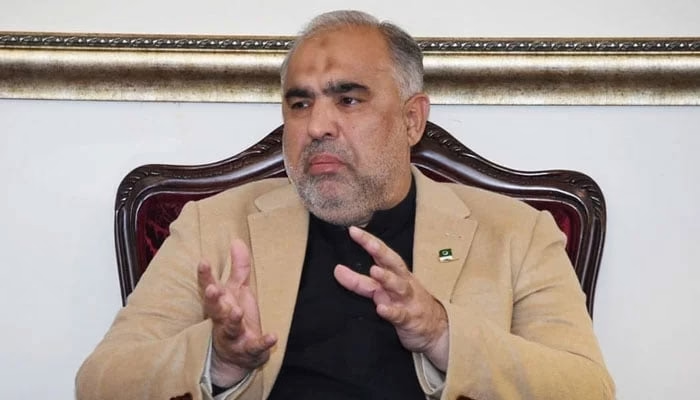Asad Qaiser Criticizes Decision Awareness Amid Political Controversy
In a sharp reaction to the recent press conference by Defense Minister Khawaja Asif and PML-N leader Talal Chaudhry, PTI leader Asad Qaiser raised serious concerns about the transparency of legal proceedings and decision-making. Speaking on the controversial 190 million pound reference case involving former Prime Minister Imran Khan and his wife, Bushra Bibi, Qaiser accused the government of political vendetta and questioned the integrity of judicial decisions.
A Controversial Press Conference
Asad Qaiser alleged that the press conference held by Khawaja Asif and Talal Chaudhry revealed a troubling pattern. “It is evident from their statements that they were already aware of the decision,” Qaiser remarked, adding that this foreknowledge raises critical questions about the independence of the judiciary. “It is clear where the decision was written,” he asserted, pointing to what he described as blatant political interference.
The PTI leader’s comments underscore the rising tensions between the ruling coalition and opposition parties, particularly concerning high-profile cases targeting key PTI figures.
Political Revenge or Transparent Justice?
Qaiser firmly labeled the case against Imran Khan and Bushra Bibi as “pure political revenge.” He criticized the lack of transparency in the trial, accusing the government of manipulating judicial processes for its own benefit.
He further questioned the motivation behind constitutional amendments aimed at securing political gains. Referring to the controversial 26th Constitutional Amendment, Qaiser asked, “If the rulers pass amendments for their own interests, will justice still prevail?” His remarks hint at a broader narrative of institutional erosion and selective justice, a recurring theme in Pakistan’s political landscape.
Concerns Over Judicial Independence
The PTI leader expressed deep reservations about the functioning of the Supreme Court. “If the apex court is made controversial and takes arbitrary decisions, how can one expect justice?” he asked. Qaiser’s statement highlights the growing perception among opposition parties that the judiciary has been co-opted into serving political agendas.
He went on to assert that the government’s alleged prior knowledge of judicial decisions represents a betrayal of justice. This claim adds to the opposition’s criticism of what it sees as a compromised legal system under the current regime.
The 190 Million Pound Reference Case
At the center of the controversy is the 190 million pound reference case, which accuses Imran Khan and Bushra Bibi of financial improprieties. The case has become a flashpoint in Pakistan’s already polarized political environment, with PTI leaders decrying it as a witch hunt.
Qaiser’s remarks echo PTI’s broader stance that legal cases against their leadership are politically motivated rather than based on substantive evidence. The party has repeatedly called for independent investigations and transparent judicial processes to restore public confidence.
Broader Implications for Pakistan’s Political System
The accusations and counter-accusations reflect deeper systemic issues in Pakistan’s governance and judiciary. The opposition’s claims of judicial bias and government overreach are not new but have gained renewed urgency amid escalating political hostilities.
Asad Qaiser’s comments also shed light on the challenges facing Pakistan’s democratic institutions. When court decisions are perceived as politically motivated, it undermines public trust and weakens the rule of law.
Call for Justice and Accountability
Concluding his statement, Qaiser emphasized the need for impartial justice and accountability. He urged the judiciary to rise above political pressures and deliver fair decisions that uphold the constitution and public interest.
As political temperatures continue to rise, the demand for an independent judiciary and transparent governance remains at the forefront of Pakistan’s national discourse. The 190 million pound reference case, and the controversies surrounding it, serve as a litmus test for the resilience of Pakistan’s democratic and judicial institutions.



